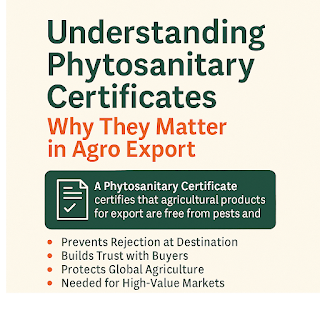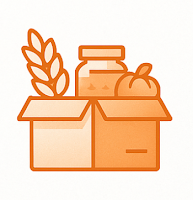Understanding Phytosanitary Certificates: Why They Matter in Agro Export
Exporting agricultural products is more than just harvesting and shipping. Whether you're dealing with dried hibiscus, soybeans, or sesame seeds, your goods must meet strict international standards. One of the most important documents in agro export is the Phytosanitary Certificate—a requirement you cannot ignore if you're serious about global trade.
What Is a Phytosanitary Certificate?
A Phytosanitary Certificate is an official document issued by a government’s plant health authority (like Nigeria's NAQS – Nigeria Agricultural Quarantine Service). It certifies that the agricultural product being exported is:
-
Free from pests and diseases
-
Properly inspected and treated
-
Compliant with the importing country's regulations
Without this certificate, your goods may be rejected at customs, delayed, or even destroyed at the destination port.
Why Is It Important?
-
Prevents Rejection at Destination
Many countries like the US, Canada, and EU nations require a phytosanitary certificate before agricultural products can clear customs. -
Builds Trust with Buyers
Buyers feel more confident when you provide proper documentation. It shows professionalism and compliance. -
Protects Global Agriculture
The certificate helps prevent the spread of plant pests and diseases from one country to another, safeguarding agriculture worldwide. -
Needed for High-Value Markets
If you want to export to premium markets or list products on platforms like Amazon, certified documentation is a must.
How Do You Get a Phytosanitary Certificate?
In most African countries, here’s the typical process:
-
Register Your Business with the agricultural or quarantine authority
-
Apply for Inspection: Officials will visit your storage or processing location
-
Product Testing & Sampling
-
Treatment (if needed): Fumigation or drying
-
Certificate Issuance: Once cleared, you’ll receive your official document
💡 In Nigeria, you can apply through the NAQS office. Be sure to book early as delays can affect shipping schedules.
Products That Commonly Require It
-
Dried hibiscus petals
-
Soybeans
-
Sesame seeds
-
Ginger
-
Grains (millet, maize, sorghum)
-
Fruits & vegetables (if fresh or semi-dried)
Final Thoughts
If you plan to build a serious agro export business, understanding documentation is just as important as sourcing the product. A phytosanitary certificate is not just a piece of paper—it’s your passport to international trade.
At BBNKNDAY, we ensure all our products meet the required standards and provide full documentation upon request.

















